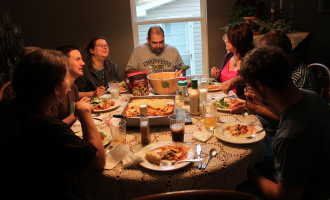
Tough financial times may be beneficial to our health?
June 4, 2015
[Published in the Homer News 6/4/15]
This month marks one extreme of our Alaskan calendar — the summer solstice is upon us with the raging return of light, the first farmers markets, the end of the school year, the explosion of green and the return of travelers, be they fur, fin, feather or people.
Layered upon the energetic buzz of this transitional time is the uncertainty of economic security for many community members and organizations. All members of our community are affected, be it directly or indirectly, by the gutted state budget that is in the throes of finalization. This is a stressful time. Thus, it is a particularly important time to extend empathy and compassion to others and ourselves.
Taking care of oneself and managing stress is hard work. It requires both learned and intuitive skills, ongoing dedication and the support of family and friends. If you already have your self-care routine down, this is a remarkable feat to be celebrated. The rest of us need your help.
Managing stress does take skills — particularly when we are bombarded with distractions and pulled in many directions.
Later this month, Homer-area residents will be receiving a package in the mail with information and resources to support individual and family resiliency. Most of the information included is tips on managing stress, taking care of oneself and fostering healthy relationships — timeless information that can benefit every single community member. This package is a culminating product of the Homer Prevention Project — a collaborative effort that has brought resiliency and how to overcome toxic stress to the community conversation.
We are expected to learn about managing stress and taking care of ourselves from our families, but we live in a culture and political system that has made it increasingly difficult for families to support these skills and provide nurturing environments. Over the last 40 years, the cost of living in comparison to the growth of wages is staggering. Citizens have had to work longer hours and sometimes take on multiple jobs just to ensure adequate income. Individuals and families are more and more stressed.
The United States population has a lower life expectancy than nearly all other rich countries, despite spending half of the world’s health care bill and having one of the highest gross national product (GNP) per capita. Correspondingly, the U.S. has some of the highest levels of poverty, poorest health outcomes and greatest health disparities of any rich country.
While it seems contradictory, multiple studies have documented improved health outcomes in United States populations during times of economic downturn. The population experiences increased leisure time with family and friends, exercise, healthier diets and increased sleep.
Additionally, economic downswings have shown increased engagement of citizens in the political process to redirect societal goals and wealth distribution. Economic upswings and expansion have been associated with increased stress: longer work hours, less sleep, increased wealth inequity, increased alcohol consumption and overeating, and increased isolation. Also, a population that is working most of the time is less involved in the political process that is directing societal goals.
According to the research, what leads to health in this state and country is not absolute wealth or growth but how Alaska’s and the United State’s resources are shared across the population.
While unlikely that economic downswings would be desired, these observations about our population health are cause for pause, reflection and action.
Our community vision is to be “Proactive, Innovative and Resilient.” While we head into a transitional time of economics, what proactive and innovative ways can we more equitably share our resources (financial and other) across our own community? What individual, family, school, community, state and national-level changes would support more time with family and friends, exercise, healthier diets, and more sleep?
It takes all levels of change — which level most inspires you?
At times like this, it’s good to remember this excerpt from a Green Dot tagline: “… No one has to do everything, but everyone has to do something.”
Megan Murphy is the MAPP coordinator and can be reached at mappofskp@gmail.com or 235-0570. All references for this article can be provided upon request.

